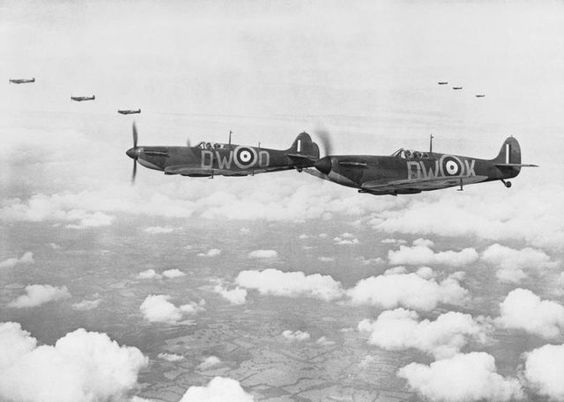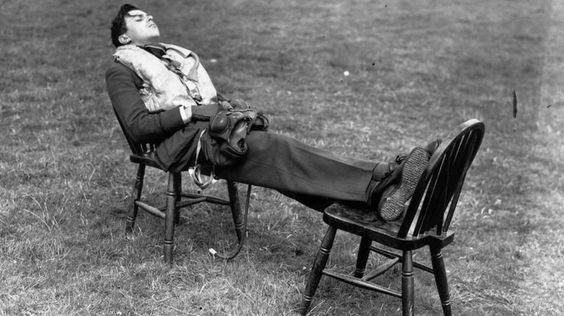Thursday 25 July 1940
 |
| Searching the skies for Germany paratroopers, a soldier stands in a standard armored Beaverette reconnaissance car of the 4th/7th Royal Dragoon Guards, Royal Armoured Corps, 25th July 1940. |
Sixty Stukas (II,/StG1 and IV StG1), assisted by S-boats, use the radar information to sortie against a convoy at first light. Convoy CW 8 "Peewit" loses five small freighters (Corhaven, Polgrange, Leo, Portslade, and Henry Moon), while five other freighters are damaged and two destroyers - HMS Boreas and Brilliant - are as well. Spitfires of RAF Nos. 54 and 65 arrive late, and the Bf 109s are waiting for them. JG26, still smarting from recent losses, escorts the Stukas. Adolf Galland of III,/JG26 pounces, and the British lose three planes in a hurry. The Stukas are vulnerable after their dives, and the RAF planes shoot two down. The action continues all afternoon, with both sides sending swarms of planes. During the afternoon, Ju 88s attack. The raids continue until 19:30.
After dark, it is fairly quiet. Most of the Luftwaffe activity is minelaying in the Firth of Forth, Newcastle and the Thames estuary.
Overall, it is a bloodbath at sea which appears to justify Luftwaffe chief Goering's strategy. Only 2 out of 21 ships of the convoy make it to Portland. It is estimated that the Luftwaffe lost about 16 planes and the RAF 8. This sounds like a big RAF victory, but all of the British losses are fighters, and the RAF fighter defenses are getting ground down. RAF No. 54 Squadron has been mauled over since the start of the Battle of Britain, losing five pilots and twelve airplanes. It is pulled from the line and sent north to regroup. Hugh Dowding of Fighter Command admits that "If we try to fight the Germans on a 1-to-1 basis, we'd soon have no fighters left."
Adolph Galland of JG 26 gets his 16th victory.
The Admiralty bows to the inevitable and orders that future convoys be conducted at night. This is difficult since the ships can't make it all the way down the coast during darkness.
Battle of the Atlantic: German battlecruiser Gneisenau completes temporary repairs (torpedoed by HMS Clyde on 20 June) at Trondheim and heads south to Kiel for a permanent repair. She is escorted by a large task force lead by cruiser Nürnberg and destroyers Galster, Jacobi, Lody and Ihn.
Convoy SL 41 departs from Freetown.
Battle of the Mediterranean: The Italian Regia Aeronautica attacks Alexandria and Haifa.
Convoy Hurry, the plan to ferry a dozen Hurricane fighters to Malta, is now projected to reach the vicinity of the island on 31 July. Submarines HMS Pandora and Proteus will bring in supplies need by the planes.
In Malta, it is a quiet day with no air raids. Governor Dobbie appoints Lt Col Vella of King’s Own Malta Regiment to the position of Administrative Command of all Maltese infantry and volunteers. This new position is designed to integrate Maltese peoples into the armed forces.
German/Italian Relations: Hitler agrees to allow Italian planes to participate in the Battle of Britain, which does not really seem necessary at this point as the battle is going reasonably well.
German Government: German Economics Minister Walther Funk gives a long speech entitled "The Economic Reorganization of Europe." It revolves around the idea of a "Greater Europe" which he admits "does not yet actually exist." He discusses a European currency union (led by Germany) free from any gold standard and notes that the "raw material situation of Greater Germany has improved immensely during the war." The Reichsmark will be the dominant currency, with all other currencies tied to it by fixed exchange rates. In fact, Germany already is doing this with Vichy France on draconian exchange rate terms.
Many of Funk's ideas sound quite similar to the later European Economic Community. It is an optimistic speech that looks forward to a seemingly early end to the war, which is the prerequisite for any of his ideas actually happening. The underpinning of the entire idea, however, is, as William Shirer points out, that the "Germans will abandon the gold standard and substitute their worthless Reichsmark, making US gold reserve useless."
 |
| Blenheim Mk IF of No. 25 Squadron taxiing at Martlesham Heath, watched by air- and ground crews, 25 July 1940. The squadron was used for night fighter operations. |
Heavy cruisers USS Wichita (CA 45, Rear Admiral Andrew C. Pickens) and USS Quincy (CA 39) depart Rio de Janeiro, Brazil, for Bahia, Brazil on their "Show the flag" mission.
British Government: The RAF announces that it has made over 1000 raids into occupied Europe since the start of the war.
Free French: Philippe de Hauteclocque aka Captain Leclerc joins the Free French in London.
Switzerland: While the Swiss are tilting toward Germany, they still fear an invasion. Commander-in-chief General Henri Guisan delivers an impassioned address to the Swiss Officer Corps on the Rütli (Ruetti Meadow), a field of great military tradition. He exhorts the officers to be prepared to resist a German invasion and to fight to the last man in an Alpine redoubt sealed off by dynamiting mountain passes.
Luxembourg: The Royal Family arrives at the Navy Academy in Annapolis, Maryland aboard the USS Trenton (CL 11).
July 1940
July 1, 1940: Vichy France
July 2, 1940: Arandora Star
July 3, 1940: Operation Catapult at Mers El Kébir
July 4, 1940: Romania In Crisis
July 5, 1940: The Five Freedoms
July 6, 1940: Hitler's High Point
July 7 1940: Dakar And Ringo
July 8, 1940: Tea Rationing in England
July 9, 1940: Battle of Calabria
July 10, 1940: Battle of Britain Begins
July 11, 1940: "Nous, Philippe Petain"
July 12, 1940: Enter Laval
July 13, 1940: German Surface Raiders Attack!
July 14, 1940: Bastille/Mourning Day
July 15, 1940: Tallest Man Dies
July 16, 1940: Plans for Sea Lion
July 17, 1940: Burma Road Closed
July 18, 1940: FDR Runs Again
July 19, 1940: Last Appeal To Reason
July 20, 1940: First Night Fighter Victory
July 21, 1940: Soviets Absorb Baltic States
July 22, 1940: First RAF Night Fighter Victory
July 23, 1940: Invasion False Alarm
July 24, 1940: The Meknés Incident
July 25, 1940: Black Thursday for RAF
July 26, 1940: Capture The Duke?
July 27, 1940: What's Up, Doc?
July 28, 1940: Destroyers Pulled From Dover
July 29, 1940: Barbarossa On The Burner
July 30, 1940: Hitler Delays Sealion
July 31, 1940: Bloody Wednesday of Olkusz
2020






